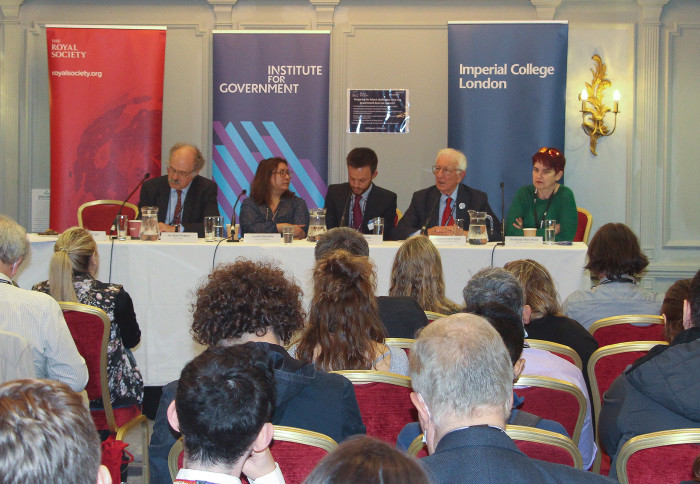Science advice key to solving global challenges, says interim Vice-Provost
by James Rae

Imperial’s interim Vice-Provost (Research and Enterprise), Professor Mary Ryan, spoke at the Labour Party conference on the government use of science.
The event, jointly hosted between Imperial, the Royal Society and the Institute for Government, looked at the state of scientific advice within the government from its role and influence during the pandemic to how scientific advice can help the government achieve its policy aims.
Speaking alongside Professor Mary Ryan, who leads Imperial's new Transition to Zero Pollution initiative was a panel made up of Chi Onwurah MP, Shadow Minister for Science, Research and Digital, Sir Mark Walport, Fellow of the Royal Society and former Chief Scientific Adviser, Labour peer Professor Lord Layard and broadcaster and commentator Ayesha Hazarika.
Beginning the event, Onwurah said that science is one of the twin engines of humanity, along with politics, and that a future Labour government would place science at the heart of its vision. Onwurah called for a long-term plan for science in the government with a target of 3% of GDP for R&D investment, as science has long transformed and democratised people’s lives, improving their prospects and welfare.
Speaking more broadly about the need to promote STEMM, Onwurah said it was vital that we expand opportunities and access to more of the population, especially in emerging technologies like AI. Onwurah continued by saying that more scientists and engineers should engage with policymakers and become policymakers themselves as government needed such input.
Government’s relationship with Science
On government’s relationship with scientists, Professor Ryan said that there are often going to be challenges when researchers engage with the government, especially around how to communicate complex technical issues and deliver evidence that can be used to inform policy. Ultimately, however, researchers wish to engage and make a difference, so academic institutions need to do far more to promote interaction between policymakers and researchers. At Imperial The Forum is working with academics to do just this.
Sir Mark Walport echoed Onwurah, saying that the modern world has been shaped by science and politics and that policymaking would be improved by the inclusion of more scientific input and advice. He stated that tackling any of the significant challenges facing the British state over the next few decades would require greater use of science and technology.

Speaking on the current obstacles to researchers, Sir Mark said that the chief obstacle was one of capacity, with civil servants and politicians lacking both the means to understand research and the time to be able to incorporate it into policymaking. He continued that COVID-19 has demonstrated that the government needs to invest more in developing our national resilience to shocks, to which scientists and engineers are integral.
The rising profile of scientific advice
Ayesha Hazarika, referring to her work throughout the pandemic, said that the profile of scientific advice on policymaking has never been higher, with scientists becoming household names across the UK through “devastating necessity.” However, she warned, this has come at a cost as the crisis has seen the promotion of more fringe voices, such as the anti-vaccination movement and the harassment of public advisers.
Scientists have become household names through devastating necessity.” Ayesha Hazarika broadcaster and commentator
Speaking about scientific influence on policymaking, Hazarika referenced her own past experience as a civil servant, saying that the structure of government with its current focus on day to day management of crises requires a complete rethink, with more resources dedicated to long term planning and preparation.
Lord Layard agreed, stating that the government focus should be on Net Zero, with the use of a mission orientated approach, similar to the moon-shot programme to determine targets, guide investments and attract talent.
Professor Ryan continued that the significant challenges we are facing on Net Zero and zero pollution will require greater input from researchers into the policymaking process. She stressed the importance of scientists “making the right policy advice at the right time.”
[On climate change] we’re saying the right things. I don’t think we’re enacting the right policies. Professor Mary Ryan
Responding to a question on electric cars, Professor Ryan called for a whole system approach that examines all the requirements and consequences that will come from adopting electric cars, such as the impact on the power grid, lithium supplies and development of battery technology. This is where researchers can significantly support the policymaking process.
Concluding the event, the panel agreed that the UK will need more scientific advice and input in policymaking for the UK to effectively tackle significant global challenges.
Article text (excluding photos or graphics) © Imperial College London.
Photos and graphics subject to third party copyright used with permission or © Imperial College London.
Reporter
James Rae
Office of the President